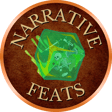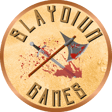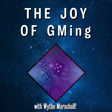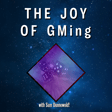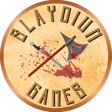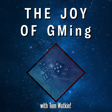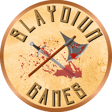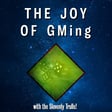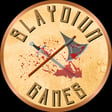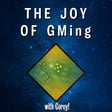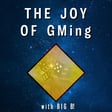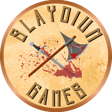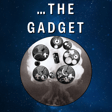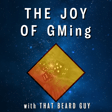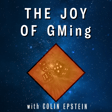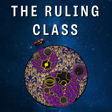Interview Series Introduction
00:00:34
Speaker
Whether you're at a game table, in your comfiest chair reading a book, or listening at home, there's nothing like a great adventure story. But they don't happen by accident.
00:00:44
Speaker
Welcome to the joy of GMing, a special interview series on the craft of great gaming. There's just something magic about sitting down to a good table with great friends, isn't there? If you're a lifelong gamer or a newbie rolling up your first character sheet, if you're a DM or a GM or just can't get enough tabletop talk in your day, this is the show for you.
00:01:07
Speaker
Each episode will bring you amazing guest speakers to talk about writing games and running them, building fantastic worlds and compelling story arcs, and oh so useful tricks of the trade. Here's some amazing stories, get inspired for your next game, and join us for an hour and a half or so of lively conversation.
Podcast Structure and Inspirations
00:01:27
Speaker
This sister series to anywhere but now, our Doctor Who actual play podcast, will be released between mods or episodes with our ongoing serialized show. We'll cover some making of and behind the scenes tidbits of our latest mod as well, so do stick around.
00:01:43
Speaker
I'm Casey Jones, writer and voice actor.
Casey Jones: Writing and Voice Acting
00:01:47
Speaker
Over the last dozen years, I've written and produced screenplays, children's animation for TV and film, graphic novels, stage plays, murder mysteries, and audio adventures. I've also been writing and running tabletop games for over 10 years. Join me as we dive deep into creativity with fellow experts in making stuff up.
Shane Rachels: DM Experience with 'Unnatural One'
00:02:07
Speaker
Our special guest today is Shane Rachels. He's a DM of over 15 years and the dungeon master behind season one, Terra, of the podcast Unnatural One. He loves telling stories, reading, practicing NPC voices, and in his free time, running games on StartPlaying.games, where you can find him as Sekyo. Links to everything in the doobly-doo.
00:02:31
Speaker
Shane, welcome to the show. It is so nice to have you here. Thanks, it's good to be here. I appreciate the chance to hang out and chat. You're very welcome. I love talking tabletop.
Campaign Design and Player Interaction
00:02:42
Speaker
I would really like to talk to you about your creative process for writing up mods for Unnatural One. For instance, I have really enjoyed listening to Ghost Ship, which is the start of your latest campaign. What can you tell our listeners about it?
00:02:59
Speaker
Ghost Ship is the latest of the arcs that we do in the campaign. I've set it up so that we use milestone leveling to kind of help make sure everybody's on the same level and stuff as far as characters and character progression and stuff goes. When I was designing the campaign,
00:03:16
Speaker
and kind of sitting down and writing out the story, the idea I had was to set everything up in arcs. Short kind of five, six episode little sessions and stuff, that way everybody knows this is what's happening, this is the main focus of this arc. This is kind of what the story is for this so that you can listen to them kind of independently if you really like that arc more than others or the story or something like that. And then combine all those into a full campaign as far as it goes.
00:03:46
Speaker
in particular honestly the big one it's the one where like i finally get to sit down and throw a big lore dump in the middle of everything and and really get that uh yeah really get that look from the players of oh so that's what this is about
00:04:01
Speaker
Um, and it's been, uh, it's, it's been fun. It really has. I'm so glad. Yeah, that's really wonderful. I have thoroughly enjoyed listening to this cast with Josh playing Grex the goblin and Sammy playing the gnome. Michael as con Courtney as gin and Jake as Ezra high tower. Were all these players friends before you recorded your, your first games?
00:04:26
Speaker
Yeah, we've been friends, some of us for almost 20 years at this point. It's been a blast, you know, hanging out with these guys and stuff, but we've only been playing D&D together for about five years or so. But we were friends, you know, kind of long before that, and I got them invested, you know, in the hobby and addicted to Dungeons and Dragons as it were. And then about a year ago or so, almost
00:04:51
Speaker
Exactly at this point. I was like, hey, let's do a podcast and everybody was immediately in and so here we are. Wonderful.
Player-Driven Story Adaptations
00:04:59
Speaker
I would love to talk about world building that you have already put into season one with Terra, T-E-R-R-A, and how you set up your characters to inhabit it. Did the world building come first? Did the PCs, like how much were you involved in the PC creation with your players?
00:05:20
Speaker
It's a good mix. So I thoroughly enjoy giving my players like agency. I love giving them the ability to input or not input as much, you know, into the world and stuff as they will. Um, I have a couple of players who are like, you know, let me focus on the character and put that character into the world and let them react, you know, the way to the world itself. And I have other ones who are like, let me build an entire underground criminal organization and make my character the main part of it.
00:05:49
Speaker
Like in the Wanted arc, for example, Greg's, Josh's character is arrested. And it's because he's a member of this criminal underground thing.
00:06:00
Speaker
Um, it's like a whole arc where he gets arrested. The party has to like clear his name and go through a whole thing. And that's all that kind of stuff. But that criminal organization did not exist in my world building before Josh created his character. And it's, it's a thing like, like I said, I love, you know, if they want to put in that much effort, I will find a way to put it into my campaign one way or the other. You know what I mean? I do. But I basically created the world and the story and left like,
00:06:29
Speaker
Not necessarily a blank slate, but blank pages in the book for them to, you know, turn around and be like, Hey, let me make this character. Let me add this in. Let me, there's another very similar thing with, um, Ezra, uh, Jake's character where he is, he's not quite a member of the nobility, but his family like runs the kind of democratic government and stuff like that or whatever. And it's like, okay, these will be characters that I have at some point. And now I have a way to tie them in with Jake.
00:07:00
Speaker
And his character and stuff like that. So it's like if they want to input that I will use it Otherwise, you know, I've kind of created the world or they just put their characters in it and then we just go from there
00:07:11
Speaker
So it's a bit of a mixed process. It's not like we all wrote it together. I do try to keep them not necessarily in the black about it, but you know, don't spoil too much. You know what I mean? I don't want them to have like know exactly what's coming and stuff like that. But at the same time, like I said, if they do give me something, I'll use it sometimes whether they like it or not. But that's for later on in the series. Absolutely. I love working with the players
00:07:41
Speaker
to find out at least one or two interesting things about their backstory and about what they want so that when I'm working on world building or mod writing that I have this immediate in to how they're thinking what they want to accomplish or who they want to accomplish it with or for like with Kate who plays our intrepid reporter Maeve
00:08:09
Speaker
From the minute that the player told me they wanted to play an investigative reporter, I knew I had a protagonist that would practically always have an immediate reason to go start digging, you know?
00:08:29
Speaker
giving them and giving their character Maeve a mystery to solve, a elusive figurehead to hunt down and interview, a dark secret to uncover. Those have not only made the story building part of it easier, but I get to fill it with texture.
00:08:52
Speaker
and characters that the character knows or is invested in getting to know. And I find that really helps add some personal investment to keeping things going, you know?
Dynamic Storytelling and Dice Influence
00:09:07
Speaker
One of my favorite things about it, you mentioned like putting in characters that your players know and stuff.
00:09:13
Speaker
going back to wanted and Josh and how much he built you know when he was creating his character and stuff he gave me a list of NPCs I kid you not two pages long with these full like vivid descriptions and stuff of them and I was like okay so I could put these characters in here and I can have them mentioned but you gave me so many and I kind of want to keep the story focused because one of the premises of unnatural one like as a podcast is that it's very
00:09:40
Speaker
focus there's not a ton of filler content you know what i mean like every arc is it's meaningful it does something to progress the story that kind of thing and i was like you know i can add these characters in i was like but look they're gonna end up being like mentions at best you know that kind of thing i was like so do this for me then let me pick a few of these and i'm not even gonna tell you which ones i pick but let me pick a few of these and i'll put them in but i'm gonna change them a little slightly i might combine
00:10:08
Speaker
you know, two or three of these characters together and kind of have like, you know, an amalgamation thing or whatever. And it's like, you're not going to recognize exactly what's going on until you get there. But you'll know it when you see it, you know, that kind of thing. And that's, that's a really fun thing to do is like, you know, you have this character that the PC created, and you're there and everything and
00:10:28
Speaker
you get to break out one of these characters that they don't see coming. They don't expect. And you get to see the look, you know, on their faces or, you know, hear their gasps of surprise and stuff. And you're like, yeah, by the way, this is that guy from your backstory. And it's so fun to see. It's it's a blast. It really is, especially when a character shows up all of a sudden and something about them is able to surprise the player.
00:10:58
Speaker
Yeah. To stay with Maeve and Kate for a second, they have on their character sheet, under their items, an IOU from a friend named Kit. That's all they have about that person. And something I've really enjoyed with our first season is bringing in flashbacks.
00:11:18
Speaker
into things to add a little bit of extra context to a scene to inform a little bit of background on a character of like oh that's what gave them the idea for so and so and also just to surprise them
00:11:31
Speaker
to see what comes up when they're playing a version of that character before they might have met the other PCs they're involved with and just get that extra little viewfinder glimpse of their past, you know? It's a fun thing if you think about characters the same way you think about people, which you theoretically should.
00:11:52
Speaker
it's it's fun to think about characters at different points in their lives and kind of you know like what uh what they may have been like before the grand adventure before everything kind of took off and stuff and it's always really fun to kind of to look at that i haven't done any sort of like flashback scenes or anything like that but i have done like scenes where they're meeting characters from their past that like you know
00:12:13
Speaker
For example, that they may not want the party to know about because that would paint them in a different light or something along those lines. And those scenes are always fun because it's like, who is this character? Like, why are they who they are? And you can't really explain that by having the character just word vomit, essentially, and kind of tell the story. You have to show it kind of in context.
00:12:34
Speaker
having those kind of scenes it just it adds so much to the story itself and it adds to the character at the same time and it's a fun thing it's such a fun thing to do
00:12:46
Speaker
It really is. I love it when we can bring an NPC to the table that already knows a character, and just like you say, suddenly inform and show this whole facet of a PC that may have played dozens of hours with us by this point, you know, can still surprise us with, wait, you had a goth face? Hang on, you had a pickpocketing face? I'm sorry, what?
00:13:14
Speaker
It's a blast, especially if it's even better when the PC isn't expecting it most of the time. And it's fun. Yeah, I try to set up my character's expectations as little as possible. Like there are mods they go into completely blind and they don't even know what the title of the mod is until they've finished the first leg of it.
00:13:40
Speaker
Yeah, that's that's been one of my favorite things. Like I've been listening to the podcast and stuff. I can't remember exactly where it was. I think it was in it might have been the first episode when you were introducing the characters and stuff. You mentioned a mod that you later run the wages of joy. And you mentioned that and said, you know, hey, I got this player in the first time, didn't tell them what they were doing. I'm like, man, that is a glorious idea, actually.
00:14:03
Speaker
Just sit him down and hand him a character sheet and just be like, so this is who you are. Even let them create the character and stuff, but tell them absolutely nothing. I was like, I'm going to do that at some point. I don't know when, but that sounds like such a fun idea. It can be, it really can be a talented actor and storyteller and friend of mine, Jack Shear. He played Trip Shine in our premiere episodes through the Looking Glass.
00:14:30
Speaker
and also came back delightfully for the two-parter across two mods of Hard Time and Rift Apart. And he also, because I've worked with him as an actor before and we know each other and there's a shorthand, and he's also an experienced
00:14:49
Speaker
Tabletop player like he's been playing games for decades so I was able to work with him on trip shine in very broad strokes and Then just trust Jack to play trip as he would play trip and bring out all these wonderful Qualities of the character like he's a little bit of a flirt like other time agents. We've met over
00:15:14
Speaker
and not the brightest bulb in the vortex manipulator. There's just something wonderful about setting up all these pieces and then letting them bump into each other and play off of each other. There is something to be said, like you mentioned, you know, giving him broad strokes and stuff or whatever. There is something to be said, like, you know, we're talking about surprising the characters.
00:15:37
Speaker
and kind of giving them the big, you know, surprise moments or whatever. But it's a, it's a fun thing when it happens for the DM as well. Absolutely. You mentioned Jack playing a trip, shine and stuff. And it's like, I don't know if you sat down and like gave him, you know, you gave him these broad strokes and stuff, but you know, tell him, Hey, I need this scene to happen or I need this kind of thing to happen or whatever. But it's one of those things where it's like you reacting to that as well.
00:16:02
Speaker
You know, throwing in those improv skills and kind of stuff like that. It's fun when it happens to you and you get put in the hot seat just as much as it is when it happens to a player. It's always one of those, oh, okay, kind of moments. And I enjoy those just as much. Absolutely. Like, I don't ever go into a scene saying, okay, here's what we need to happen, because that feels a bit too constrictive.
00:16:31
Speaker
We're not putting this game on rails. The characters get to take them in their own directions by their own choice. And the rolls, the dice rolls will have as much to say about it as anything else. Always. Always. The dice can take the story in a completely different direction than anyone anticipated sometimes.
00:16:56
Speaker
they absolutely can. In our most recent aired episode, because I'm a huge fan of Doctor Who, because I love when things go wibbly wobbly, because as we've seen on the show, cause and effect do not always go in the right order, and sometimes greater symptoms can show up in reality from problems that don't necessarily look
00:17:21
Speaker
directly attached to them, throwing those kinds of random consequences, still attached to dice, still attached to choices that the players are making, based on things they've already done, can completely upend the game.
00:17:37
Speaker
In the first draft of what was kind of expected to happen in Hard Time, I fully expected the Fixer to either sweet talk the villain of the day, Felix Fugit, into letting him get in touch with the wayward Time Lord, or, you know, get something going. And instead, he just sets off this cataclysmic explosion and has to roll.
00:18:04
Speaker
for the aftershocks. And when he said odds and they came up snake eyes, the earthquake that he kicked off with that moment of choice completely changed the direction of the second half of the story. Immediately we've got this ticking clock of we need to get out of here right now before the entire planet crumbles.
00:18:26
Speaker
It's wonderful to have characters be able to make those decisions and take scenes in a completely different direction than what we were expecting. There's a scene very like that. I can't spoil too much because of our recording process we record. We just released episode 30 and we have upwards of like 48, 49 episodes recorded and we give ourselves plenty of time to make sure they're edited and stuff so that we don't have to
00:18:53
Speaker
you know, stress ourselves to have them edited in times, you know, stuff like that. Oh, sure. So the players and I kind of know what's coming, you know, far ahead of time when these episodes release and stuff. But there's a thing that happens in one of our most recent episodes that we recorded. And when it happened, I'm sitting there going, huh, what is this going to do to what I had planned?
00:19:14
Speaker
which was for them to take a left and they took a right, you know what I mean? And it's fun looking after the fact, or even maybe before the fact, but I consider D&D to almost be a reactive game a lot.
00:19:30
Speaker
It's fun to sit there after the fact and go, okay, so these guys just, you know, took this right turn. What are the, you know, almost butterfly effect style consequences that are going to come out from this and how was that going to affect the story? And, uh, you know, thinking about like, we've taken a break since recording that last episode. It's been like about two weeks now.
00:19:52
Speaker
And it is in my head constantly of going, huh? So now that they've done that, that means I have to put this character here and kind of move this over here and kind of rearrange the whole, you know, map almost that I had made based on what they were doing before. Sometimes maybe it's a little bit frustrating. Other times it's like, OK, this is maybe the greatest thing that's ever happened in the history of Dungeons and Dragons, I'm pretty sure.
00:20:18
Speaker
You know what I mean? That has to be a good feeling.
Collaborative Tabletop Gaming
00:20:20
Speaker
Oh, yeah. It's pretty great. And doing those consequences to play your actions and stuff, not all of them are good. You know, I'm sure we'll see. I haven't actually listened to beyond hard time. That's where I'm at in the actual podcast and stuff. And I'm curious to see if there will be other consequences past that that end up showing up down the road. I actually eagerly awaiting that. I'm not going to lie.
00:20:43
Speaker
wait until you hear. To respond to your thoughts on, like, is it frustrating? Is it is it vindicating when things turn left when we're expecting them to go right or vice versa? As a GM, I used to be a lot more restrained, personally self restrained.
00:21:03
Speaker
by how a story, quote unquote, had to go in order to feel like it was in a given genre, you know, by loosening up those strictures by saying, OK, we're not going to determine from the beginning how the game is going to end. We're going to determine how the game would go if the heroes do nothing or if the heroes do this, that or third thing. And I think there's something
00:21:30
Speaker
important about the world building you're doing so that you have realistic consequences or realistic in terms of the game. You know obviously magic A is magic A but to have built a world where they can turn right instead of turn left
00:21:46
Speaker
and have those dominoes that they're brushing with their shoulders and they go knocking them over in other directions. It is, I find it liberating. Speaking personally, when we started out, I had 12 mods of stories in my mind to lay out and tell for the Fixer and their companions over the course of 20 some episodes of listening enjoyment.
00:22:15
Speaker
The actual roadmap of the order of those stories has changed two or three times already with the characters making the choices they're making, the more I'm learning about the characters,
00:22:32
Speaker
because the better I get to understand them, the better I get to know what the characters will want, what the PCs playing them are, what the kind of choices they're likely to make. It has definitely upended the table a bit of like, well, okay, if this is the tempo they're going for this specific goal, we're gonna have to move some things around. So it's really satisfying for them to get to this point and still have some cake for the end of the season.
00:23:01
Speaker
tabletop gaming in general, what it tends to be is collaborative storytelling, right? Oh, yes.
00:23:07
Speaker
It takes. There's a there's a certain point in every like dungeon master's journey to being a dungeon master and stuff where you realize that you can sit down and you can tell a story. You can basically write a novel, you know what I mean? Or a screenplay or anything else like that. And you can write the story from end to beginning and you can do that. But the story that the players want to tell may be completely different, right?
00:23:32
Speaker
And it's one of those things where like when you are playing in a Dungeons and Dragons world or when you're playing in any tabletop world and you know you have these other people that are part of the
00:23:43
Speaker
story it takes a certain amount of flexibility you have to to learn to bend and yet you can still get that story out you know what I mean and you can have that kind of straight path from end to beginning that you wrote you know when you had the story envisioned and when you created everything around it kind of did all that stuff or whatever but then when you add the players in you have curves you know what I mean you have like
00:24:06
Speaker
sometimes even loop-de-loops to kind of get back to where it needs to go, you know what I mean? And that story after it's all said and done is sometimes very different than that straight path novel that you had written before. And we've come across a lot of those moments in our campaign where I've had to like kind of, like I said, you know,
00:24:29
Speaker
okay well I guess this character is over here now you know what I mean that kind of stuff and it's there is definitely something invigorating about it you know what I mean like it just kind of sitting there and going okay like okay now I have to rewrite this whole next session and I didn't mean frustrating as in like you know it's actually it's it's like frustrating in the sense of well I had this whole next section planned yeah I can't do that
00:24:55
Speaker
But I get to write this whole next section, you know what I mean? And there is something cool about going, OK, well, everything I had planned is out of the window. And now I have until next week to get this settled back in the place. Let's go. You know what I mean? Yeah, let's settle down and get into it. It's one of the best parts of playing tabletop games, honestly.
00:25:18
Speaker
Can you give us an example from a recent game without too many spoilers? I'd love to hear about your personal experience. Like has there been something that Courtney did or that Sammy did that surprised you and turned things in a new direction?
00:25:31
Speaker
Potentially we talked about ghost ship and we talked about how you know, this was gonna be the big moment. So the arc before this camera rescue the idea here is that the the four main villains of the game are the four horsemen of the apocalypse, you know pestilence war famine death and When the players figured this out because they figured it out like we have on patreon. We had this episode It's called bonus actions. There were just us sitting around talking about the game kind of an after-action report kind of thing
00:26:00
Speaker
Oh, that's really great. And they figured out the four horsemen angle during one of the bonus actions. Like one of the players looked at me and said, are we fighting the four horsemen? And I was like, yeah, I'm so happy somebody figured it out. But during the the previous arc, they met pestilence for the first time and they ended up fighting him. And there was this big moment where I was getting giving them a chance to kind of talk to him to try to figure out what's going on from there. And they didn't. They just went straight into fight. You know what I mean?
00:26:30
Speaker
Um, so I had to kind of figure out a different way to deliver that story, to deliver that exposition and kind of set it in, you know, actual motion. So the very next arc in Ghost Ship, the Kamareska arc ends with the death of one of our characters.
00:26:46
Speaker
It ends with Jin, Courtney's character, actually, just dropping dead. No saves, no ifs, ands, or buts, perfectly healthy before, and she just dies. Drops like a stone. Yeah, just while she's sleeping. And one of our other characters is actually sleeping in the same bed with her and Sammy, actually, our gnome friend. And I described this big thing as like, you know, the weight of Jin's body, like falling on top of her and all this other stuff. And what I did,
00:27:15
Speaker
was change another one of our characters. I changed death and rather than having, you know, pestilence kind of deliver this exposition and stuff like that, my thought was they just killed one of death's siblings. Death is going to have something to say about this.
00:27:33
Speaker
So at the end of the arc, she retaliates, death retaliates, and she she ends up killing the entire party and she takes them all to the afterlife. And there's this big scene in the afterlife and stuff where, again, I was expecting there to be this whole exposition thing and I was going to drop stuff like metaphysics and I was going to drop stuff like, you know, the greater universe as a whole, not just the continent, not just the world where these guys are and kind of stuff like that. I was planning to go into this big, huge thing.
00:28:02
Speaker
and one of our characters, Grex, played by Josh goes, will you just shut up and tell us what's going on? And it was like, yeah, sure, I guess. So look, here's the deal.
00:28:15
Speaker
And it's one of those like, you know, things that like I said, you know, the player tells the story, there would have been this big, huge discussion about like the way the universe works and who the four horsemen are and who they're goddess that they're trying to save is and so on and so forth. There would have been this big, huge kind of, like I said, you know, almost exposition style Lord Dumpin and all that where I can get out all these details.
00:28:38
Speaker
But they didn't want that. They wanted the nitty gritty. They wanted the, you know, tell us exactly what's going on and then let us leave or we'll fight death right now by God. You know what I mean? And it's like, OK, cool. But because that that exposition and stuff was delivered the way it was, because it had to be so upfront and so fast, there are certain details my characters don't have now.
00:29:23
Speaker
cavorted off to the other side of the continent and kind of did, you know, or went back to their home base in Bastion. They could have done any of these things, but because they acted the way they did because they straight up killed pestilence, you know, their other siblings have something to say about it. And that kind of changed the direction the story was going to take from that point, you know, taking that left turn instead of the right.
00:29:30
Speaker
those details may be relevant further down the line.
Challenging Traditional Narratives
00:29:43
Speaker
Yeah. And it's, it's actually great because I don't think
00:29:47
Speaker
When you hear the four horsemen, you kind of think of them in a certain order. Like if you think, okay, you know, I'm going to fight the four horsemen, you always consider death is definitely going to be last. You know what I mean? Well, there's something just so final about it. Exactly. It's, um,
00:30:04
Speaker
It's almost preconceived, you know what I mean? Like it's almost required at a certain point. And kind of taking death and putting her right in front of my characters immediately through them for the biggest loop I think I've ever seen. And it was an absolute blast playing it out because none of them saw it coming. And I was so happy to see the look on their faces during that. That's great.
00:30:30
Speaker
I'm not surprised the characters decided to sidestep some universe-level exposition for their personal stakes, because we can be motivated to tell a story that spans all of time and space.
00:30:48
Speaker
We are dealing with a table of people numbering three to five who have very real designs on where they want to go, what they want to try and do, and what they're willing to do to those that are standing in their way. And even when that doesn't quite fit the story that we had in mind, it can still be an absolute crackerjack of a story.
00:31:14
Speaker
Oh, yeah. I mean, it's like I said, that that moment where in, you know, at the very end of the camera, Eska arc, that that last like 10 minutes of that episode, where, you know, what I did was Jen's is she's not an orphan, but her father has been dead for a long time. He died in the kind of cataclysmic event that kind of set off our story, you know, 200 years in the past kind of thing.
00:31:39
Speaker
When I described her dreaming, first off, she's an elf, elves don't dream, they trance. And when I described her dreaming, and then meeting her father, that was already one big dun dun dun. Yeah, that was already one big to do. That was already a giant, you know, WTF style moment going on for the table. Sure. Then when she figured out who it was,
00:32:02
Speaker
an even bigger jump and then like a roller coaster down when I flash back to the ship. And I'm like, you know, hey Nissa, you feel Jen's, you know, body on top of you. And they realized that their actions have these consequences that we were talking about, like kind of on the story. Seeing those consequences, it's one thing knowing that I have all this lore written that I know exactly how the universe works that I know, you know,
00:32:31
Speaker
like their world isn't the only one that their god isn't the only god that there are forces even bigger than gods and stuff out in the universe the fact that they don't know that on one hand kind of sucks for me because i'm i wrote all this and i'm like okay this is this is amazing at least in my eyes and i'm like you know this is this is the most fantastic story that's ever been written i might be a little bit biased on that but
00:32:57
Speaker
But I don't get to deliver that information. You know, I don't get to sit down and go, okay, like this is how this all works. But on the other hand, them taking that right turn instead of turning left, them kind of dropping this exposition and doing all that will also have its own set of consequences down the road. You see what I'm saying? Yeah. And like I mentioned, like the butterfly effect before and stuff, you know, you start off from one point and you just have this massive web of
00:33:23
Speaker
events and stuff that happens or whatever I may not even get to ever explain any of that I may not get to settle down and go okay so this is how all of this works but maybe them not knowing at the end of the story you know how wherever that story ends
00:33:39
Speaker
will also have consequences, you know what I mean? And maybe I don't get to tell that particular part of the story in this campaign. Maybe that's something we can come back to further down the line. Maybe we return to Terra in season four or season five or something along those lines, and they get to see the consequences of those actions, you see what I'm saying? Like, just layers and layers and layers on storytelling. And it's one of the best things that you can do at a table. Absolutely.
00:34:08
Speaker
A PC does not need to know the inner workings of every level of the infrastructure in order to be able to throw a giant rock at that infrastructure and have a definite unyielding impact on the way things are going.
Player Influence in Game Worlds
00:34:27
Speaker
And like, it's great if the story comes pre-packaged with someone who is invested in understanding things like the rules of space and time or the laws of life and death as they are prescribed. And sometimes you don't get that lucky. Sometimes it's more about the adventurers breaking someone out of prison or getting on a ship and realizing they're actually traveling to the land of the dead.
00:34:52
Speaker
Mm-hmm. It's a blast seeing like how players will turn around and make the world that I spent so long working on into their world You know what I mean? Mm-hmm It's kind of hard to explain but it's it's a fun thing to watch and it's a fun thing to witness Kind of at the table this kind of evolving story based on like, you know, I can say like five words I could be like you all meet in a tavern and
00:35:18
Speaker
and let it go from there. And what happens at the end will be its own story completely different than if you had said, you all meet in a tavern. You see what I'm saying? It's so fun. It's one of the best aspects about Dungeons and Dragons or any tabletop game, like pretty much bar none in my opinion.
00:35:39
Speaker
you think that you're building this world, and then when the players sit down to it, you realize it's not your world. It's theirs. We just built it for them. And they're going to be making all of the decisions and choices that push their version of the story forward. It's dynamite. In a previous episode of The Joy of GMing, we talked
00:36:07
Speaker
with Ryan Blake about NPC voices. And you mentioned that one of the things you enjoy doing is practicing NPCs. I wanted to ask you, what do you look for in the voice of an NPC to set them apart? What is your NPC creation process like? Can you tell us something for our listeners? Most of the time, I'm in kind of a weird boat with NPCs a lot of the time, because when I create NPCs, typically what I do is I create upwards of
00:36:37
Speaker
maybe four, maybe five NPCs that I will have throughout the entire campaign. These will be characters that our party deals with on a very regular basis. And I'll tend to come up with something like really unique for those are not necessarily unique because they may sound like other voices. Other people have done, but I will make them unique from each other. Right. Typically with all the background, like I am very lazy when it comes to being a DM, I'm going to be honest.
00:37:05
Speaker
A lot of times I will create NPCs kind of on the fly and I'll just, you know, they go to visit some random shop or something like
Creating Memorable NPCs
00:37:13
Speaker
that. And I'm like, okay, you find, um, let me Google real quick and the elf whose name happens to be, let me Google real quick, Rami, you know what I mean? Stuff like that. Um, sure. And those particular NPCs, what I'll do is I'll use some variation on these, you know, voices that I've designed for other characters. Um, but as for like,
00:37:34
Speaker
Deciding the actual voices for characters I play often a lot of times I like to kind of break tropes and try voices I've never tried before. Oh, yeah, cuz you can you can take any like for example Typically dwarven characters and stuff will have a Scottish accent or something or some variation on that You know, there'll be a little bit Irish or a little bit Scottish or something like that and it's it's a very easy thing to do, right? Yeah
00:37:59
Speaker
Like in Terra, one of our main characters that we meet is named Leo. He owns the airship that our party makes use of and stuff throughout the story. He's an elf, and I made him Scottish.
00:38:11
Speaker
just because, you know what I mean? I was like, you know what? I don't have a dwarf, but I'm pretty good with a Scottish accent. Let's make him Scottish. Yeah. You know what I mean? A lot of times it's, it's almost like what I feel like at the moment. You know what I mean? What I'll do is I, I have a repertoire of maybe five or six real voices and accents that I can do. And I tend to vary those. You know what I mean? Like I'll change pitch, but I'm still using the same accent. All of a sudden it's a different voice, right?
00:38:41
Speaker
And it's the little things that you can do when you're doing stuff like you can have a Scottish accent and you can have someone talk like this the entire time and it's just kind of doing your thing or whatever. But if you change the little things, if you change like the way that they enunciate words and you have them actually pronounce like their T's and their D's and stuff like that, a lot of times I would just use my own voice.
00:39:08
Speaker
But because I don't typically annunciate those T's and D's like that, but I do when I'm playing this character, it sounds completely different. You know what I mean? Little changes like that will make for a whole host of voices that you can use for pretty much anybody. I also kind of forget to use voices sometimes. I'm not gonna lie. It happens to the best of us.
00:39:32
Speaker
Yeah, or I'll I'll change their voice without realizing and it happens for one of our characters, Halloran, who just kind of has this kind of country voice, you know, he's kind of gruff and he's got a
00:39:43
Speaker
almost a little bit of that Southern Bell gentleman kind of thing going on. That kind of inflection to me is almost British at the same time. And I'll find myself accidentally slipping into like a country British at the same time. And I have to stop myself. Hang on. I've gone cross eyed. Basically, that's that's why I say I like practicing voices. I have a job where
00:40:09
Speaker
I'm afforded a certain amount of autonomy and stuff. You know what I mean? I don't have like people looking over my shoulder and stuff all the time. So when I'm like walking around, I'll practice those voices under my breath and stuff, just kind of talking to myself while I'm, you know, doing my job. And it's, it's led to more than one situation where I have like customers at the store. I work at just looking at me kind of weird. Cause I just said something really weird in a, you know, like trying out my quote unquote female voice.
00:40:37
Speaker
I'm saying that and then they ask me something and I look at them and answer in a completely different tone and it's thrown them for a loop. Um, and I've gotten, like I said, more than a few weird looks when it comes to that. But a lot of the times that's for like, like designing voices and stuff. It's really just me messing around and trying to see what I can come up with. You know what I mean? Like I don't necessarily, I don't really draw like inspiration from anything or whatever. It's just me, just me messing around. You know what I mean? And trying to see like what kind of weird stuff I can do.
00:41:04
Speaker
And then going, hey, that would make for a really fun you on T voice. Let's make it happen. You know what I mean? Let's see what weird stuff we can do. I feel like that not only could that be on a T shirt, but like that needs to be on the at the top of a blank sheet of paper for world building. Let's see what kind of weird stuff we can do.
00:41:27
Speaker
Yeah. Trying to get weird with it sometimes will lead to really wild situations. So there's a character in the game whose name is Lucas, and he's Nissa's grandfather. Nissa is a gnome, and gnomes typically have really long lifespans. She herself is 180 years old, and she'll live to be 300 or so. But when I was thinking about her grandfather, I was thinking about trying to do an old person voice and stuff.
00:41:54
Speaker
And so I came up with a voice off the top of my head, and it was just I'm going to get really weird with it. I'm going to make him a little bit senile, a little bit, you know, kind of wacky. And I'm like, let's just get weird with it. And as it turns out, later on in the campaign, I had to describe Lucas and my table said, if you killed Lucas, we will riot. And I didn't realize that they had become so attached to this like kind of throwaway character that I made.
00:42:21
Speaker
just because of his voice, just because I did something weird, you know what I mean? They absolutely adored him. So it's fun. If you get weird with it, a lot of times it'll work out. Sometimes it won't, sure, but you can learn from that, you know.
00:42:37
Speaker
and kind of move past it. You absolutely can. With NPCs, with finding their voices, for me, sometimes it's a process that's as simple as casting them in my head as an actor that gave a memorable performance in something, probably British, probably Doctor Who.
00:42:59
Speaker
You know, as a starting point, there's an NPC that is just modeled off of Steven Merchant because I've never seen him play anything but idiots.
00:43:09
Speaker
And I wanted to set myself a challenge of, how do we play a likable idiot? And the answer was Brandable Smockit, who's, oh, yeah, he means well. He really means well, but he's not terribly bright, sorry. Like, as long as he's not being mean, and he actually wants to do well at his job, and he's pretty much toothless, great. Yeah.
00:43:36
Speaker
that's the thing like you've got voice actors out there who have this this massive like repertoire of voices you've got people out there like Matt Mercer for example who the man will come up with voices and noises that I did not know a human being could
00:43:54
Speaker
like physically make. He did he recently guessed DM'd I guess on Dimension 20. And he makes a noise during that that I have not heard outside of the heaviest of death metal bands. And he just makes that kind of thing. Well, no, like it's it's it's really hard to explain. But it's like deep down in his chest and it's gurgly and weird. And it's I don't even know how to explain it. It is just
00:44:21
Speaker
uncomfortable to hear. But the thing is, like with voices, not everybody has to be that talented or that good. You know what I mean? You can you can use your voice for everything. You can I can talk like this. Like I said before, just change certain things about it or whatever.
00:44:39
Speaker
essentially be a completely different person by just like describing actions you know what I mean so like I can have like you don't you don't have to have like if you want to describe a character you know being an idiot for example to use your example describing them stepping on a rake right
00:44:57
Speaker
and kind of going through that, you can use your own voice and then turn around and make a character somebody completely different. Like when you said Steven Merchant and then you said idiot, my first thought was Chris Farley. I'm like, okay, I want to make like a Chris Farley character now. You know what I mean? Like that kind of slapstick style comedy. Yeah. You know what I mean? But I'm like, okay, so how do you do like a Chris Farley voice? I can't, you know what I mean? I don't think my
00:45:24
Speaker
you know, vocal timbre and stuff would allow me to replicate that. But I could make a character like that. Yeah. And just describe actions and then use a different voice and stuff. Like the versatility of that kind of thing is is useful a lot. Very much so. Like there's something to be said for NPCs that simply embody a particular mood or attitude, you know,
00:45:50
Speaker
you can use the same register or the same pitch for two or three different characters. But if one of them is in a pretty cheerful mood and ready to help you, that's fine. I'm here to facilitate whatever needs to go on.
00:46:04
Speaker
And if someone else is just annoyed and kind of just in a pissy mood and they're clearly not here for your benefit or anyone else's, they're here for their very own or someone that's just delighted. Like, you know, I'm in a great mood. How can I help you guys? What's going on? And all three of those same vocal chords.
00:46:23
Speaker
You know, but it's just a different just a different mood. Kind of going back off to the original question that kind of started off this whole tirade of voices. You said like, you know, like inspiration and stuff. And I think that's a good place to start. Right. Is mood. Think about the character. Think about what kind of situation they're in and how you're like character, you're in your PCs and stuff are going to interact with that character or how you want them to interact with that character.
00:46:53
Speaker
And you can start off with just a mood. If you're interacting with the villain, you can make them, you know, cold and calculating, draw out the words a little bit and enunciate those T's and D's in such a way that, you know, kind of stuff like that. That smug superiority of someone who has to slow down to make sure the plebeians understand him. Exactly. Or,
00:47:20
Speaker
You can use that same voice and just go a little bit more cheerful and hopeful with your tone and kind of think about the things that, you know, you want them to be able to see the sunlight in the morning and stuff like that. Think about that mood that you're trying to set and you can go from there and create thousands of different voices. You really can. You start off with the bass and then just change it, just vary it just a little bit here and there.
Storytelling over Voice Variety
00:47:43
Speaker
You might eventually end up with that Mercer's repertoire to kind of circle back. Maybe, but also maybe not because
00:47:50
Speaker
Dear Lord, that man. We all have our skill sets. And if you're on this show, if you're listening to this show, then clearly you care about doing a good job as a GM or a DM.
00:48:05
Speaker
as important and more important than any accent or character lilt or anything like that is wanting to tell a good story, wanting to get the players involved, wanting them on the edges of their seats, waiting to hear what happens next, waiting to make the next thing happen because it's their role in the initiative.
00:48:28
Speaker
Different voices different having range with accents and things like that. That's great but it's nowhere near as important as the ability to Grip the listener to draw them in as deep as they can possibly go Mm-hmm. Yeah, that's hit it on the head
00:48:51
Speaker
That is one thing I always see people talking about being a DM and stuff. It's like, I can't do many voices and stuff. You don't have to. You really don't. No. You're not making a demo real. No. You can accurately portray characters just as easily by describing them. You can use your voice and walk up to someone, but if you describe their character kicking a puppy.
00:49:13
Speaker
They're going to immediately know that this character is bad news, you know what I mean? And that's all you need to describe that scene just as much as do that voice. And you can do whatever. You don't need this huge repertoire of voices and stuff. Anybody can get by as long as you can have that moment where they immediately know this is a good guy or where they immediately know this is a bad guy.
00:49:34
Speaker
And you have that in the story. You're good. You're golden. They will immediately hate that person because they kicked a puppy. That's all you needed in that story. You know what I mean? Yeah. It's there. It's done. Continue. You know what I mean? We have seen the antagonist kick a puppy. We have seen a love interest kick a puppy. Oops. The protagonist now has some thinking to do about their love interest.
00:50:02
Speaker
So you have time with young and inexperienced GMs who are starting out.
Advice for New GMs
00:50:10
Speaker
What do you, Shane, want them to know about your approach to GMing? What are the most important things? How do you know you've done it well?
00:50:22
Speaker
First off, those are two very different questions. One, how do I know I've done it well? You're good, but I'll answer the second question first, right? How do you know that you're doing well? You don't. One of the biggest things about DMing is that you kind of set yourself up to be
00:50:37
Speaker
Not necessarily the center of attention, but you're the center of attention very often and you have to be to kind of continue the story and stuff. And the biggest thing DMs, especially new DMs or even GMs from any tabletop system. The most important thing is just get out there and do it. A lot of times you're not going to do a fantastic job.
00:51:00
Speaker
And as long as you can look at it and you can learn from that, you can go, OK, here's what I did wrong. You can move on. And there are still times like I'm running a whole podcast. I run several games on start playing games. And every time after the episode or after the session or whatever, I will tell my players, hey, I thrive on feedback. You know, let me know what I did wrong.
00:51:22
Speaker
let me know what I did right. Tell me so that I can move forward. And a lot of times, because people are the way they are and stuff or whatever, I don't really get those responses. I don't get the review and start playing. My players are just like, okay, you did cool. And then they just continue on doing what they're thinking or whatever. And it's one of those things where you don't always know if you did a good job. Right?
00:51:44
Speaker
But the key to all this is just let go of that anxiety, right? The first step to being a DM is literally just to sit up and do it. And you can, you can do that in multiple ways. You can run a pre-established module. D and D5E in particular has a.
00:52:00
Speaker
wealth of stuff to draw from. Seriously, they've got something like 20 something sourcebooks, both of like one shot adventures, campaign settings, full 20 level campaigns, campaign settings. I mean, they're about to release Planescape pretty soon, which is absolutely wild. And you know, there's like 17 settings in that one book alone kind of thing.
00:52:24
Speaker
You don't even have to necessarily homebrew or write your own stuff. You could just use one of these adventures to get started. Or if you don't like any of those adventures and you do want to write your own thing, if you have a story that you want to tell, the only way that you're going to get that out there is to just do it. Seriously. Your first couple sessions may not go so well. Starting on start playing games, for example, I have DMed for 15 years.
00:52:50
Speaker
But every time I have DMed, I have DMed for friends. I have DMed for people that I personally know and have known for a decent amount of time. So it's one of those things where like, I know exactly what they're expecting and I know how they're going to play. And I know the chaos that they'll bring to the table so that I can expect that kind of so on and so forth. But getting started on start playing games, for example, I don't know the players, you know what I mean? They have come to me because they want an experience and kind of stuff like that. But I don't know any of these people. I don't know.
00:53:20
Speaker
how they're going to react to my particular style of storytelling. I don't know how they're going to react to my character voices or my, you know, rulings and stuff in the game. And I won't know unless I just do it. Unless they tell me you kind of have to assume that you're at least doing a good job. Most people will not kind of give you positive feedback a lot.
00:53:43
Speaker
It's kind of the same idea as something like Yelp, right? Most of the reviews, bear with me here. It'll make sense in a second. Most of the reviews you see on websites like Yelp or Google reviews and stuff are not positive reviews. They're not like good things where they're like, this is the best product ever made. Nine times out of 10, they're negative, right? And it's one of those things where it's like, okay, if no one's telling me that I'm doing a bad job, but they continue to show up every week,
00:54:09
Speaker
they continue to play they continue to get invested in stuff even if you're not hearing that kind of positive feedback you're doing fine if they're continuing to show up if they're there on time if they're willing to you know get into character and stuff you're doing as good as can be expected at the very least right absolutely and nine times out of ten if you do something wrong
00:54:29
Speaker
If you do something that people don't like, they'll tell you and you can use that to grow. You can use that to continue to expand and you can go, OK, maybe I don't need to do that anymore. Or maybe even I don't need to do that with this particular group. But the other group that you're playing with will accept that kind of thing. But it all goes back to the beginning of like just just.
00:54:50
Speaker
do it because you're not going to know any of these things unless you experience it. And that's the biggest thing to starting out for like fresh DMs or even fresh players can take that same kind of advice and stuff is just do it. Go from there as long as you're able to learn from your mistakes, you'll be fine one way or the other. You know what I mean?
Importance of Session Zero
00:55:10
Speaker
I find it interesting but not necessarily surprising that what you've been saying overlaps a lot with what other people that we've had on the show have said. The prevailing wisdom of don't worry too much about making mistakes, keep going, learn from feedback, and don't worry
00:55:32
Speaker
about how you're doing, just focus on doing a good job. I do want to say though, I think the value of a Session Zero cannot be overstated. Because in terms of playing for the first time with new players, with new characters,
00:55:50
Speaker
who may or may not even know the system this well. Having a session zero so that we can kick the tires on character concepts, on gaming mechanics, on chemistry at the table. We did a poll recently asking
00:56:06
Speaker
fans what they looked for most when they were looking and considering listening to an actual play podcast. And we asked them about like, is it the plot? Is it the bells and whistles? Is it the team chemistry? What do you what do you most look for? What's the most enjoyable part for you? And what I was delighted to find was that more than anything, they looked for good team chemistry, for good table chemistry. And I kind of have to agree
00:56:36
Speaker
that one of the most enjoyable things for me is, just like listening to Unnatural One, the chemistry of the players, the chemistry of the PCs, they get along, they know each other, there's some back and forth, there's real listening going on, you know?
00:56:56
Speaker
Yeah I mean my players again most of us have been friends we've been playing Dungeons and Dragons together for almost five years and stuff at this point. It was one of those things where like I've been DMing for 15 years and I started playing Dungeons and Dragons back when I was in high school and a friend of mine's dad used to run
00:57:15
Speaker
one of those like 20 year long style campaigns where they met like every week you know perfectly on time and stuff wow man i would be i would be playing video games in the other room but i would be listening to this and i was like yo let me get involved in that but a lot of my friends at the time you know they weren't interested in dungeons and dragons and this is before websites like start playing games and stuff come up
00:57:38
Speaker
So I only had a couple of people to kind of play this with. But when, you know, like I said, like about five years ago or so, Josh actually was like, hey, have you guys ever tried playing Dungeons and Dragons? My eyes light up, my ears perk up and I appear in a robe directly next to him. And I'm like, hey, you know, let's let's get this going. When the players are ready, the GM appears.
00:58:04
Speaker
Oh yeah. It's, it's one of those things where like we've, we've been friends for so long that the chemistry is not just the chemistry of like the players or the characters themselves, but of the, the players, you know, you'll see a lot of times in the campaign itself, my players will actually like rib me and I go after me and stuff because I mispronounce a word. There was a thing that happened recently with the word adrenaline.
00:58:30
Speaker
For some reason, when my brain says the word adrenaline, it puts a D in there, so it's adrenaline. Everybody at my table immediately stopped what they were doing to go after me for a solid five minutes over the way I pronounced the word. And I was totally involved the entire time because I swear up until that moment, I thought that word actually had a D in it. More than the one.
00:58:53
Speaker
And I was like, okay, so maybe that's not the case, but that kind of chemistry that we have is born from, you know, that long friendship and stuff. And that chemistry, it shows at the table in moments like that, where, you know, we can pick at each other and we can
00:59:07
Speaker
laugh at each other and laugh at ourselves in the process. But starting out, it does take some time to kind of build that chemistry with other people. A lot of people are kind of naturally reserved, I guess, when they're meeting new people for the first time. It takes a little while to open up, you know what I mean? And we didn't really have that problem starting out with our podcast because
00:59:30
Speaker
Again, we've known each other for, you know, so long that it's, it's over half our lives and stuff at this point. And we, we kind of already had that chemistry involved, but session zeros to kind of figure out that chemistry and stuff. Yeah. There's session zeros are super important for multiple reasons.
00:59:47
Speaker
Like, you can use Session Zero to make sure that everyone in your game is okay with the tone of the story because, you know, every story could be completely different. Yeah. You can use Dungeons and Dragons, you know, fifth edition is incredibly versatile for what it does. Absolutely. And you can have, you know, a sci-fi campaign, you know, something similar to like a Doctor Who.
01:00:10
Speaker
or they even really spell jammer not too long ago or something like Planescape. It's like a big world hopping adventure or something more homebrew. There's
01:00:20
Speaker
Entire Adventures, if I'm not mistaken, Waterdeep Dragon Heist and Dungeon of the Mad Mage all take place within one city. Stuff like that. Can I have to use Session Zero to set the expectations? You know what I mean? Yeah. No, Session Zeros are great for setting expectations. And just like you said, establishing tone, the pacing, the world. It's your pilot, essentially.
01:00:46
Speaker
You know, it's your pilot script of like, well, this is what we're trying to go for. These are the characters that we want to be involved. And it's OK. It is OK if a table never gets past session zero, because it is just as much about discovering what doesn't quite click while you're looking for that click. You know, not every player or every DM wants the exact same thing from
01:01:15
Speaker
tabletop role-playing game. And that's part of the reason why so many different tabletop role-playing games exist. I mean you've got everything from like Dungeons and Dragons 2. I'm gonna be honest until Courtney like saw your stuff on Twitter and we kind of started having the conversation about me appearing on the show and stuff. I did not know that a Doctor Who role-playing game existed. I probably should have because I am a big fan of Doctor Who and I am a big fan of tabletop role-playing games.
01:01:40
Speaker
And I should have known that there was a system, but I just didn't. It never even occurred to me to look, that's okay. But like the tone and stuff for all these different games and stuff could be completely different. Not everybody wants a high fantasy style, you know, Dungeons and Dragons. Some people like to play stuff like Shadowrun or Cyberpunk or Ravenloft, you know, any of these other games. That session zero, you know, even within the same system, like I said, not everybody wants the same game. That session zero will set those expectations.
01:02:09
Speaker
In addition to stuff like you know party chemistry in addition to stuff like player chemistry or even certain like rulings There's a lot of people who will say like if you don't rule potions as a bonus action in D&D 5e I'm not playing with you stuff like that
01:02:25
Speaker
At session zeros, we'll go ahead and weed those out, you know what I mean? And make sure that everybody at the table is having fun. And there's more to that too, because some games will get real dark. You know, some games will have some real messed up stuff in it.
Experimenting with Game Systems
01:02:39
Speaker
And even stuff like lines and veils and...
01:02:41
Speaker
you know, safety lines and stuff like that can be important in a Session Zero. It might be players who don't want to play in games like that. Absolutely. It may be players who, you know, have certain content triggers and stuff like that they don't want to deal with. And Session Zero will kind of weed those things out and make sure that everybody at the table is having a fun time, which is ultimately the goal of these kind of games.
01:03:02
Speaker
Yeah, is that everybody's having fun. That's the reason 99% of us do it is to have fun. Even those out there who are doing something like a podcast or doing something like start playing games where they're, you know, they're getting paid to do something with a tabletop role playing game and stuff. If they're not having fun,
01:03:23
Speaker
They're probably not going to continue doing it, even if they are getting paid and stuff like that. Yeah. It is fun at the end of the day. That's going to be driving everybody. And not everybody has fun in the same kind of way. Absolutely not. Some people want that sword and sorcery experience. Others want a good blaster and a personal force field at their side.
01:03:45
Speaker
And, you know, a third party might all be about solving a murder mystery at a exotic hotel in the Alps. Or fighting off the fishmen of Innsmouth. Because that's how they enjoy themselves. I do love me some color. But this kind of goes back to that same to kind of circle back to the question you asked about like first time DMS and stuff. That's also another really good
01:04:14
Speaker
experiment with different types of games, different stories, even role-playing systems. I use Dungeons & Dragons 5e pretty much exclusively because I know it best and because it's so versatile. But many other systems work better for a lot of different other things and that's another good example is you don't have to play D&D, you don't have to play Doctor Who 2e, you don't have to play Pathfinder, you don't have to play Shadow Runner, Cyberpunk or any of these other things.
01:04:40
Speaker
There's plenty of game systems out there to play around with. And you might find that one of those other systems are better at telling the story that you want to tell. Or make your own. Letting the players tell the story that they want to tell. Yeah, any of those things. That's another really good tip for aspiring DMs. Play around with it. Experiment. Try different systems, yeah. Yeah, there's tons of options out there. Even Doctor Who games. Even I suppose Doctor Who.
01:05:07
Speaker
I'm already looking forward to kicking the tires on kids on bikes. I've seen kids on brooms played on dimension 20 during their side quest season magic and misfits or misfits and magic and found it engrossing not
01:05:26
Speaker
because of the Hogwarts-esque, Harry Potter-esque world of magic, but the slightly even more collaborative and interactive effects of the storytelling with the impact of the dice rolls. It's not quite D&D, and it's definitely not anything like Doctor Who, and that's the beautiful thing. It doesn't have to be.
01:05:51
Speaker
All we got to do is get on the same page about how the rules work and then we're off to the races There's a real fun system that I've been thinking about looking into called fade accelerated. Yeah
01:06:03
Speaker
There's a podcast called I Cast Fireball, shout out to Thomas and those guys. They have another side podcast, very similar to the Joys of GMing, like a podcast within a podcast thing. Where one of their players takes the role of DM and runs Fate Accelerated games. And they have, they run kind of the same arc based system that I do, but every arc is like a completely different world. Their very first season, just to put it into perspective for you, is Jurassic Bake Off.
01:06:30
Speaker
Where dinosaurs are playing the great bake-off? British television and they also did mice born which is my favorite one redwall and Excellent Brandon Sanderson's miss born series Combined into one thing where they use lactomancies the magic of cheese And so on and so forth and it's that man knows so much about cheese. It's not even funny Again to kind of encompass this entire conversation. We've had like back to the first rules get weird with it
01:07:00
Speaker
Yeah. Have a mouse that flies through the air and uses Lactomancy. Try out these different systems, try out these different stuff, and just get out there and do it. And you never know what's going to show up. As long as everybody's having fun. Follow your joy. You're there. That's
Future Aspirations and Community Connection
01:07:16
Speaker
it. As long as you're not hurting anybody, as long as you're not making anyone at the table uncomfortable, follow your bliss. Mm-hmm. That's good life advice, not just tabletop advice.
01:07:27
Speaker
first do no harm then find your joy and that's that's honestly one of the things like one of the reasons we started the podcast is because we all love Dungeons the Dragon so much we've had an absolute blast for the past five years getting together and kind of doing this and it's one of those things where like you know we hope uh one day that the podcast may be able to take off we hope we might be at like something like critical role level or nat pod level or
01:07:53
Speaker
High rollers to shout out another huge podcast and stuff like that or dimension 20 or any of these other big podcasts and stuff And you know when you start off a podcast like this There's always that small little wish that dream that hope that you know You'll end up being able to do this like as a career freeze. Mmm, but the thing is even if we don't right even if this you know The podcast never takes off. I have followed the same rules that I've set forth here. Whatever. I got weird with it. I
01:08:20
Speaker
I've changed up what I believe to be the standard for like a for D&D actual play podcast and stuff with the way our podcast is kind of set up and like the arc based format and then the smaller shorter episodes and campaigns and stuff that's
01:08:36
Speaker
It's not a four hour critical role episode and stuff like that. And then I did it. You know, I got out there, I put out my story and then we'll see where the dice lies. But that is one of the things like, you know, chase your joys, chase your dreams. Absolutely. We might not get to that point, right? We may not get to the point where I'm at, you know, dimension 20 level or whatever, or where I can host. All we can do is roll the dice. We don't know how they're going to land. Yeah. Again, I don't know.
01:09:06
Speaker
It has been one of the funnest things that I have been able to do in my entire life is run this podcast and have fun with my friends and then let other people join in on that fun. Meeting some of the fans and stuff, like I've made pretty much lifelong friends.
01:09:23
Speaker
these people who are like fully infested and stuff in it or whatever and I'm like I will fly you out and put you on the podcast if you want you know stuff like that I mean it all comes back to just do it I hate to repeat that line so much but it I mean it's it's it is fairly true I have been fortunate enough to work on a number of different kinds of
01:09:46
Speaker
creative projects. Some were books, some were graphic novels, some were stage plays, and not all of them have been what I would call traditionally successful in terms of, oh well this sold a million copies, or oh this sold even a thousand copies. But the
01:10:05
Speaker
The things I learned from these experiences, the joy I felt connecting with an audience, being able to stand in the back of a filled house, watching them, watching something that I had written, like these are memories I'm going to carry with me the rest of my life. And the only reason I have them is because I went for it. You know, I just went out and did it. And that can inform your work down the road.
01:10:34
Speaker
The mistakes you make yesterday can inform the storytelling you do today that becomes the polish of the job you do tomorrow, you know?
01:10:45
Speaker
This is a perfect example, right? Like doing this kind of like, you know, interview chatting with you and doing this whole experience, right? I never figured that anyone would ever want to sit here and talk and have this kind of conversation and stuff. And then would, you know, willingly publish this kind of thing and get out there and like, like, Hey, check this guy out, you know, that kind of thing. I never figured I would be doing anything like this.
01:11:11
Speaker
But this is the first ever actual like interview style thing I've done. And honestly, I hope I get to do a lot more for obvious reasons. I hope you do too. But I would never have this kind of experience this kind of fun. If I didn't get out there and just go for it, you know, just yeah.
01:11:29
Speaker
It is not easy to find one's own tribe. I think being able to get online and go to places like Discord where you can find some safety from hate speech and talk safely with people and get to know other people. And by celebrating the things that bring you joy, that make you happy, that's how you find other weirdos who like this stuff that you like.
01:11:58
Speaker
And there will be somebody else out there. There will. There absolutely will. To tell a secret, some of the Joy of GMing episodes have been more popular just in terms of plays than episodes of our actual storytelling with sound effects and immersive sound environments behind them. You know, like we're trying to do world building and all of this nice narrative. And honestly, some people just enjoy talking about storytelling more. And that's fine.
01:12:29
Speaker
That's absolutely fine.
01:12:30
Speaker
Yeah, I mean, that's there. There are a ton of people, especially like with the like the popularity of stuff like Stranger Things, you know, kind of bringing Dungeons and Dragons in particular into like the main spotlight. There's a ton of people like trying to get involved in this kind of stuff. And that's one. It's great for the hobby. It's fantastic to have an inflow of like a bunch of new people who are interested and who want to get involved. Some of them may not stick around, some of them will.
01:13:00
Speaker
But that's just part of the whole industry, part of the whole business. You were talking about how this type of episode gets bigger. It kind of goes back again. People like different things. Some people may not like listening to an actual play. They may prefer to actually get out there and get on the table or on the screen or whatever and actually play it. And some people like us, for example,
01:13:24
Speaker
love writing these kind of worlds love building these huge expansive universes and kind of doing stuff like that and they may never actually play a game they may never you know they may never put their ideas out onto paper or put them out in a podcast or put them out onto a screen or anything like that
01:13:43
Speaker
But there is somebody out there who will enjoy the same things that you do, even if it's just us sitting here talking about how to do character voices, for example. Someone out there can do a lot of weird character voices at the family reunion, and they want to learn how to do more. And they'll listen to this episode and go, that's a fun idea. You know what I mean? You mean I can actually do that? Yeah. You can have all kinds of content and stuff out there. And there will be somebody out there who enjoys it always.
01:14:12
Speaker
Yes, there will. Shane, how can our listeners get in touch with you? You can find us on Twitter or any of our other podcast platforms or anything else like that just by going to linktree.com slash unnatural one. It's got a link to pretty much everything. Every podcast platform we're available on and all our social media is on there. All in one nice, neat little place. Beautiful. And the links to unnatural one will be available in the doobly doo.
01:14:41
Speaker
Shane, I want to thank you one more time for being on our show today and sharing your experiences with our listeners. Not a problem. It's been fun and I look forward to one, listening to it and two, hopefully somebody gets something out of this. That's kind of why we're doing this. I hope you guys enjoyed it just as much. Beautiful.
01:15:01
Speaker
And finally, to our listeners, another great big thank you for sharing your precious time with us. If you feel it's been well spent, please share the joy of GMing with your friends who are looking to enjoy themselves. You can email your questions for me and our players and send fan art to anywhere but now podcast at gmail.com or questions for our future guests. And if you'd like me to run a game of Doctor Who for you, reach out on startplaying.games.
01:15:30
Speaker
If you like what you hear, leave a review, rate the show, and follow us on Blue Sky and on Twitter at anywhere but now with an underscore at the end. And wherever you get your podcasts. Links to everything in the doobly-doo. From all of us, I'm Casey Jones. There's exciting things to come, my friends. I'm glad you're along for the ride. Thanks so much, and have a great day.

